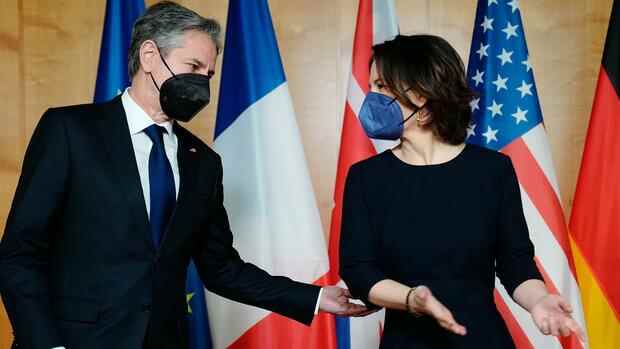Berlin, Brussels, Dusseldorf Demonstrating unity is what US Secretary of State Antony Blinken’s visit to Germany is all about. “Regardless of how Russia decides, it will find the USA, Germany and Europe united,” said the American on Thursday in Berlin at the joint press conference with his German counterpart Annalena Baerbock.
“This unity gives us strength that Russia cannot match.” And he will demonstrate this unity to his Russian counterpart Sergey Lavrov at the meeting in Geneva on Friday.
The US wants to avoid the impression that Europe is left out of talks with Russia. The federal government wants to show that the EU still plays a role. Standing by Blinken’s side, Annalena Baerbock emphasized: “We agree.” The only way out of the crisis in Ukraine is a political one.
Only one does not play along with the image of unity: Emmanuel Macron. The day before, the French President had irritated with his proposal to hold talks with Putin. That would be it then with the transatlantic unity.
Top jobs of the day
Find the best jobs now and
be notified by email.
French Foreign Minister Jean-Yves Le Drian was able to explain his president’s motives to Blinken on Thursday. Together with Baerbock, he is working on reviving the Normandy format, in which Ukraine, Russia, Germany and France are negotiating. Both want to travel to Minsk soon.
Discussion of possible sanctions
Differences also remain in sanctions policy. The US wants to cut off the supply of dollars to Russian banks. The Germans are pushing for exceptions so they can continue to pay for Russian gas supplies. Baerbock emphasized: “We are in absolutely close coordination with a view to joint sanctions,” Baerbock puts it. The range of sanctions includes the energy issue.
Blinken explicitly mentioned the Nord Stream 2 gas pipeline as a means of exerting pressure on Russia and referred to the statements made by Federal Chancellor Olaf Scholz, who said that if Russia escalated further, all measures would be on the table. A meeting with Scholz was scheduled for later in the afternoon.
The Russia expert Liana Fix therefore sees the transatlantic cohesion, which is urgently needed to deter Moscow, somewhat strengthened: “It is very important that Chancellor Scholz has cleared up any ambiguities about the position of the coalition among Germany’s partners: that the German-American agreement to Nord Stream 2 and Germany is a reliable partner in the transatlantic alliance,” says Fix, who is a fellow at the German Marshall Fund.
At the same time as Blinken and Baerbock threatened Moscow with sanctions, Scholz’s party friend Manuela Schwesig spoke up. In her video-recorded greeting at the German Economic Committee on Eastern European Economic Relations, she emphasized her delight that Nord Stream 2 was now complete. She hopes for “a speedy legal approval process”. As a possible solution to the Ukraine conflict, she sees only one means: “The West can offer Russia to negotiate arms control and disarmament very seriously.”
Blink tries to clear Biden irritations
The question of what next step Russia could take to trigger Western sanctions is also a point of contention between the US and the Europeans. First a full-scale Russian invasion? Or even cyber attacks, acts of sabotage or a partial invasion like in Crimea eight years ago? The day before, US President Joe Biden had also caused uncertainty in this regard.
More on the subject:
At the press conference marking his one-year anniversary in the magnificent East Room of the White House, Biden talked and talked and talked – to the despair of his national security advisers. He casually explained how Russia could get past the united western sanctions front. A major attack would have serious consequences, a “minor intrusion” might not. In the Kremlin, they must have listened carefully to the nervous-looking US President.
Blinken tried to sweep the pieces back together. He emphasized that any new aggression in the Ukraine conflict would have consequences for Moscow. Any border crossing by Russian forces will result in a “quick and tough joint response” from the United States and its allies.
But even below the threshold of an open attack, Russia’s actions could be destabilizing. The Western allies have therefore examined “every possible scenario” to determine a “coordinated response”.
Fear of escalation is great: “Suppose he will invade”
EU Commission President Ursula von der Leyen also threatened at the virtual Davos World Economic Forum: “If the situation gets out of control, if there are further attacks on Ukraine’s territorial integrity, we will respond with massive economic and financial sanctions.” The transatlantic community is in this regard “steadfast”. Russia’s attempt to divide Europe into spheres of influence is unacceptable. “If there are attacks, we are ready.”
There is a great fear that Russian President Vladimir Putin could actually invade Ukraine about two months after his troops deployed on the Ukrainian border. “I suspect he will invade. He has to do something,” Biden said frankly.
Ahead of the US-Russian talks on Friday, Russia appeared at least deliberately unimpressed by the threats from the western alliance. The Defense Ministry in Moscow announced that it would hold large-scale maneuvers in the Mediterranean, the Atlantic and the North Sea in the coming weeks. More than 140 warships, 10,000 soldiers and 60 aircraft are involved.
In the end, according to US Secretary of State Blinken, the question of whether there will be a military escalation or not depends solely on Vladimir Putin.
Baerbock and Blinken are in favor of a peaceful solution
More: Ukraine conflict: Macron wants a new security and stability order for Europe
